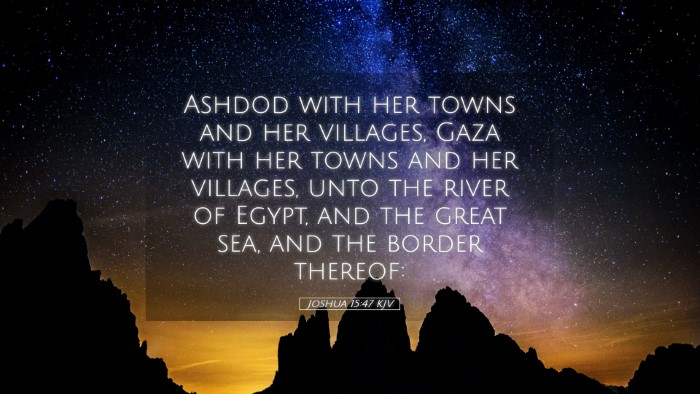Bible Commentary on Joshua 15:47
Verse: "Ashdod, with her towns and her villages, Gaza, with her towns and her villages, unto the river of Egypt, and the great sea, and the border thereof." (Joshua 15:47)
Introduction
In Joshua 15:47, we see a comprehensive detailing of territory assigned to the tribe of Judah, emphasizing the geographical boundaries and significant cities such as Ashdod and Gaza. This verse serves as a pivotal point in understanding the allocation of land within the Promised Land and offers deep insights into the historical context, theological implications, and practical applications for believers today.
Historical Context
The conquest of Canaan was led by Joshua after the Israelites' exodus from Egypt. The land distribution was not merely a logistical concern but a fulfillment of God’s covenant promise to give Abraham’s descendants a land of their own. The cities mentioned in this verse—Ashdod and Gaza—were prominent Philistine cities, signifying not only the geographical reality but also the ongoing struggle between Israel and the Philistines.
Commentary Insights
Matthew Henry’s Perspective
Matthew Henry notes that this record of cities serves to illustrate the largeness of the inheritance of Judah. He highlights that despite the challenges faced by the Israelites, God’s promise prevails in granting them a substantial portion of land. Henry also mentions the strategic importance of these cities in relation to trade and defense, underlining their significance in the socio-political landscape of ancient Israel.
Albert Barnes’s Interpretation
Albert Barnes elaborates on the geographical implications of the borders, noting that the mention of the river of Egypt indicates the southern boundary of Judah's territory, extending to the Mediterranean Sea. He emphasizes the importance of these borders in defining the nation of Israel’s territorial claims and the significance of the great sea (the Mediterranean) as a symbolic and literal barrier against foreign invasion. Barnes points out that this delineation affirms the divine guidance that led the Israelites to the land.
Adam Clarke’s Analysis
Adam Clarke offers a thorough examination of the cities listed, providing their historical significance and role within the biblical narrative. He underscores that Ashdod and Gaza were strongholds of the Philistines and highlights that despite their prominence, they were to be included in Judah's territory as part of God's plan. Clarke also emphasizes the ongoing conflict that would ensue in these regions and how they foreshadow the challenges the Israelites would face in maintaining their inheritance.
Theological Implications
The allocation of land described in Joshua 15:47 carries profound theological implications. It illustrates God’s faithfulness in fulfilling His promises and His sovereignty over the affairs of nations. The mention of specific towns serves as a reminder that God is intimately involved in the details of His people’s lives. It also reinforces the idea of inheritance—both in a physical and spiritual sense, prompting believers to reflect on their own inheritance in Christ.
Practical Applications
For pastors, theologians, and students, Joshua 15:47 can be a source of rich discussion regarding the nature of God’s promises. As we reflect on the land allocated to Judah, it prompts us to consider:
-
Inheritance: Just as the Israelites were given a physical inheritance, Christians are heirs to a spiritual inheritance through Jesus Christ (Ephesians 1:14).
-
Divine Guidance: The meticulous detailing of borders encourages believers to trust in God’s guidance for their lives and ministries.
-
Conflict and Resolution: The ongoing struggle for the land serves as a metaphor for spiritual warfare, reiterating the importance of perseverance in faith (Ephesians 6:12).
-
Community and Relationship: The cities and their surrounding villages reflect the importance of community among believers, reminding us to foster relationships within the body of Christ.
-
Global Perspective: Understanding the geopolitical significance of the regions encourages believers to pray and engage with global issues from a biblical perspective.
-
Covenant Faithfulness: The actions of God in history remind believers of His unwavering faithfulness, encouraging them to act in faith amidst uncertainty.
-
Identity: The establishment of the borders contributes to a sense of identity and belonging, showing how God defines His people.
-
Hope: The promise of land can be seen as a hope for a future where God reigns and His people dwell in peace.
-
Preparation for Leadership: Understanding the intricacies of Joshua's mission can aid in preparing current and future leaders in faith to fulfill their calling with diligence.
-
Continuity of God’s Plan: This allocation not only marks a historical moment but connects to the ongoing narrative of God's redemptive plan throughout Scripture.
-
Cultural Engagement: By recognizing the cultural and historical context of biblical passages, modern believers can engage thoughtfully with contemporary issues facing society.
-
Blessings of Obedience: The verse prompts a reflection on how obedience to God results in blessings, both personally and corporately.
-
Celebration of Diversity: The variety of towns highlights God's creation of diversity, encouraging appreciation for varied cultures and practices within the church.
-
Mission Mindedness: Just as the Israelites were called to possess the land, Christians today are called to engage in the Great Commission (Matthew 28:19-20).
-
Future Restoration: The promise of land points toward the ultimate restoration and new creation described in Revelation, fueling hope for believers.
-
Understanding God’s Justice: The conquest and distribution of land reflect themes of justice and divine judgment against the nations dwelling in Canaan, encouraging a deeper understanding of God's righteousness.
-
Impact on Worship: The historical and geographical insights serve to enhance the understanding of worship practices and their rootedness in God’s acts throughout history.
-
Studying Scripture: Recognizing details in the biblical text encourages believers to immerse themselves in Scripture for deeper understanding and revelation.
-
Encouragement to Persevere: The Israelites' journey to claiming their inheritance can inspire modern believers to persevere through trials in pursuit of God's promises.
-
Community Responsibility: The sharing of spaces and resources in the towns reflects the responsibility believers have toward one another in communal living.
-
Faith in the Future: The anticipation of inheritance should inform present faithfulness and stewardship in the lives of believers.
-
Learning from History: The historical narrative provides lessons on faithfulness, disobedience, and the ramifications of both over time.
-
Covenant Community: The verse reflects the concept of the covenant community to which believers belong and the responsibilities therein.
Conclusion
Joshua 15:47 serves as a potent reminder of God's faithfulness and meticulous attention to detail in the fulfillment of His promises. By examining this verse through the lenses of historical context, theological implications, and practical applications, believers are encouraged to see the strength of their inheritance, the importance of community, and their call to engage in the larger narrative of God’s redemptive history. The land promises to Israel continue to resonate with profound implications for Christians today, inspiring hope, unity, and action in their spiritual journeys.


